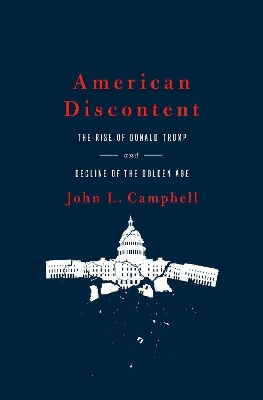
American Discontent
The Rise of Donald Trump and Decline of the Golden Age
Seiten
2018
Oxford University Press Inc (Verlag)
978-0-19-087243-4 (ISBN)
Oxford University Press Inc (Verlag)
978-0-19-087243-4 (ISBN)
Grounded in the underlying economic and political changes in America that stretch back decades, American Discontent provides a short, accessible, and nonpartisan explanation of Trump's rise to power.
The 2016 presidential election was unlike any other in recent memory, and Donald Trump was an entirely different kind of candidate than voters were used to seeing. He was the first true outsider to win the White House in over a century and the wealthiest populist in American history. Democrats and Republicans alike were left scratching their heads--how did this happen?
In American Discontent, John L. Campbell contextualizes Donald Trump's ascendance to the presidency by focusing on the long-developing economic, racial, ideological, and political shifts that enabled Trump to win the White House. Campbell argues that Trump's rise to power was the culmination of a half-century of deep, slow-moving change in America, beginning with the decline of the Golden Age of prosperity that followed the Second World War. The worsening economics anxieties of many Americans reached a tipping point when the 2008 financial crisis and Barack Obama's election, as the first African American president, finally precipitated the worst political gridlock in generations.
Campbell emphasizes the deep structural and historical factors that enabled Trump's rise to power. Since the 1970s and particularly since the mid-1990s, conflicts over how to restore American economic prosperity, how to cope with immigration and racial issues, and the failings of neoliberalism have been gradually dividing liberals from conservatives, whites from minorities, and Republicans from Democrats. Because of the general ideological polarization of politics, voters were increasingly inclined to believe alternative facts and fake news.
Grounded in the underlying economic and political changes in America that stretch back decades, American Discontent provides a short, accessible, and nonpartisan explanation to Trump's rise to power.
The 2016 presidential election was unlike any other in recent memory, and Donald Trump was an entirely different kind of candidate than voters were used to seeing. He was the first true outsider to win the White House in over a century and the wealthiest populist in American history. Democrats and Republicans alike were left scratching their heads--how did this happen?
In American Discontent, John L. Campbell contextualizes Donald Trump's ascendance to the presidency by focusing on the long-developing economic, racial, ideological, and political shifts that enabled Trump to win the White House. Campbell argues that Trump's rise to power was the culmination of a half-century of deep, slow-moving change in America, beginning with the decline of the Golden Age of prosperity that followed the Second World War. The worsening economics anxieties of many Americans reached a tipping point when the 2008 financial crisis and Barack Obama's election, as the first African American president, finally precipitated the worst political gridlock in generations.
Campbell emphasizes the deep structural and historical factors that enabled Trump's rise to power. Since the 1970s and particularly since the mid-1990s, conflicts over how to restore American economic prosperity, how to cope with immigration and racial issues, and the failings of neoliberalism have been gradually dividing liberals from conservatives, whites from minorities, and Republicans from Democrats. Because of the general ideological polarization of politics, voters were increasingly inclined to believe alternative facts and fake news.
Grounded in the underlying economic and political changes in America that stretch back decades, American Discontent provides a short, accessible, and nonpartisan explanation to Trump's rise to power.
John L. Campbell is Class of 1925 Professor in the Department of Sociology at Dartmouth College and Professor of Political Economy in the Department of Business and Politics at the Copenhagen Business School. He is the author of numerous books, most recently The Oxford Handbook of Comparative Institutional Analysis (2010), The National Origins of Policy Ideas (Princeton, 2014), The World of States (Bloomsbury, 2015), and The Paradox of Vulnerability (Princeton, 2017).
PrefaceA Note on Sources, Alternative Facts and Fake NewsChapter 1: How Did This Happen?Chapter 2: Economy and ClassChapter 3: Race and EthnicityChapter 4: Ideas and IdeologyChapter 5: Polarization and GridlockChapter 6: The Election of Donald Trump and BeyondReferencesIndex
| Erscheinungsdatum | 10.07.2018 |
|---|---|
| Verlagsort | New York |
| Sprache | englisch |
| Maße | 236 x 163 mm |
| Gewicht | 476 g |
| Themenwelt | Sozialwissenschaften ► Ethnologie |
| Sozialwissenschaften ► Kommunikation / Medien ► Journalistik | |
| Sozialwissenschaften ► Politik / Verwaltung | |
| Sozialwissenschaften ► Soziologie | |
| Wirtschaft | |
| ISBN-10 | 0-19-087243-8 / 0190872438 |
| ISBN-13 | 978-0-19-087243-4 / 9780190872434 |
| Zustand | Neuware |
| Haben Sie eine Frage zum Produkt? |
Mehr entdecken
aus dem Bereich
aus dem Bereich


